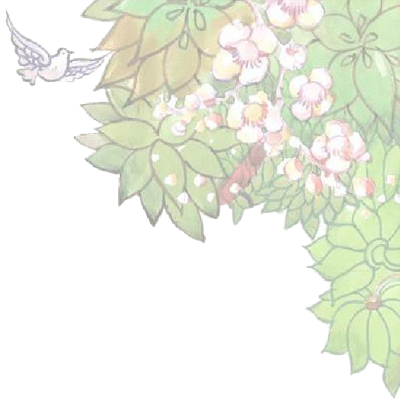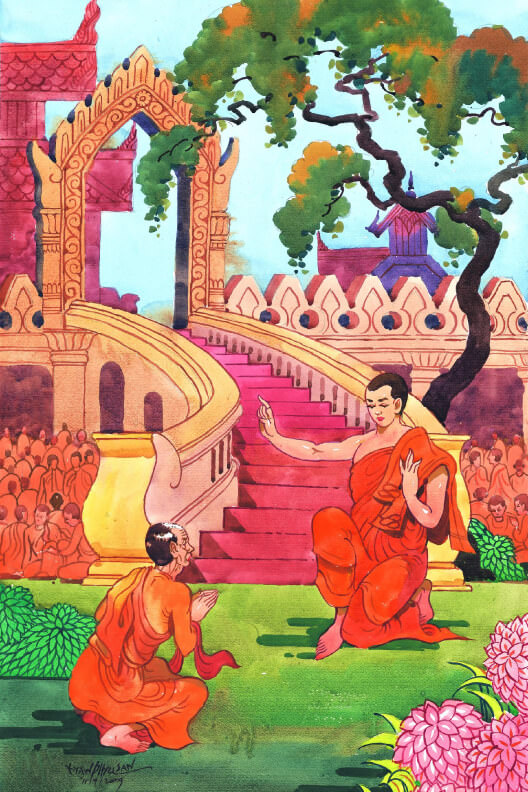38話 女の出家・・・・ 比丘尼サンガ成立と八重法

第4部 ブッダをめぐる人々
第2章 さまざまな女たち
38話 女の出家 ・・・・ 比丘尼サンガ成立と八重法

釈迦国のカピラヴァットゥ(カピラ城)とコーリヤ国の間に平和をもたらした後、世尊は活動の舞台をヴァッジ国のヴェーサーリー(広厳城)へ移され、大林の重閣講堂(クーターガーラサーラー)(訳注:尖塔状の講堂)に住まわれた。
世尊が五回目の雨安居をそこで過ごされている間に、父のスッドーダナ王が重病である、と耳にされた。王はもはやたいへんな高齢であった。王は愛する息子たち、孫たちが、出家して世を捨てた現実を受けいれることはできたが、それでも、いつもそばにいないことをさびしがっていた。これを知られて世尊は、主要な二人の弟子であるナンダ尊者(世尊の異母弟)とアーナンダ尊者(世尊の従兄弟)を伴って、カピラヴァットゥへ向かわれた。王は息子たちをふたたび見て、たいへん幸福であった。世尊は王に法の話をされて慰められた。王は説法を注意深く聴いて、たちまちのうちに阿羅漢に達した。高齢のため、病気から回復はできなかった。しかしながら、亡くなる前に、涅槃の至福を楽しむことができたのである。
マハーパジャーパティ・ゴータミー妃は、夫のスッドーダナ王の死を悲しんだ。しかし、彼女の悲しみは長くはつづかなかった。精神的にとても成熟していたからである。妻としての義務は終わった、と彼女はさとった。同様に、母としての義務も。息子のナンダ王子は比丘になっていた。娘のナンダー王女は、もはやこどもではない。かくて、いまや彼女には、やることがなかった。そして、俗世間に疲れていた。世尊の御前で僧団に入りたい、という彼女の願いは強くなっていたのだが、世尊はそれを許さなかった。
マハーパジャーパティ・ゴータミーは、世尊がこの前の里帰りでカピラヴァットゥのニグローダ僧院に滞在されていたとき、世尊に女性として比丘尼となることを許してもらうため、次のように願い出たのであった。
「尊い方よ、どうか女性が、正自覚者の説かれた法(ダンマ)と律(ヴィナヤ)において、家のある者から家のない状態に出家することを、お認めくださいますように」
しかしながら、世尊は、このように言って断られた。
「もう、よろしい、ゴータミーよ。正自覚者の説かれた法(ダンマ)と律(ヴィナヤ)において、女性が家のある者から家のない状態に出家することを願ってはなりません!」
彼女は二度、三度と願い出たのだが、そのたびに世尊は同じ答えをされたのだった。彼女は、悲嘆にくれて、宮殿に帰るあいだ中ずっと泣いていた。
さていまや彼女は、もう一度願い出てみるのにちょうどよい時機をみつけたのだ。そのころ、釈迦族の王子の元の妻で、夫が僧団(サンガ)に加わったので寡婦になった女たち五百人が、彼女のもとへやってきた。女たちは、比丘尼の僧団に入ることを世尊がお許しなされるように、と彼女に願い出た。女たちは頭を丸め、黄衣(袈裟)をまとって比丘尼の格好を装い、マハーパジャーパティ・ゴータミーに率いられ、カピラヴァットゥからヴェーサーリーまで、はるばる五十ヨージャナ(約八百㌔前後)の距離を歩いた。
女たちがヴェーサーリーに着いたとき、きゃしゃな足は腫れて傷つき、身体はちりやほこりまみれでベトベト、涙がほほを伝っていた。疲労困憊して全身の痛みのなかで、女たちは大林の重閣講堂の門の正面に立った。女たちは僧院の境内にあえて入る勇気がなかったのである。
マハーパジャーパティ・ゴータミーのひどいありさまを見て、衝撃を受けたアーナンダ尊者がやってきて、きいた。
「おお、ゴータミーさま、どうして玄関ポーチの外側に、このように立っておられるのですか?」
ふるえる声で彼女が答えた。
「おお、アーナンダ尊者よ、世尊が女たちに、出家することをお認めくださらないからでございます」
アーナンダ尊者は彼女に、こう勧めてみた。
「もしそうなら、ゴータミーさま、わたしがこのことを世尊にお願いしてみますので、それまでどうかここでお待ちください!」
それから、アーナンダ尊者は世尊のもとへ行き、世尊の養母マハーパジャーパティ・ゴータミーに起こったことを申しあげた。尊者は彼女の代わりに、女たちが出家することを尊い方が認めてくれるように、と懇願したのだが、世尊は、彼女が比丘尼になることは認めない、という答えを譲らなかった。尊者は二度、三度、懇願してみたが、同じ答えしか返ってこなかった。このため、尊者はちがうやりかたで懇願してみた。
「尊い方よ、それでは女性は、正自覚者の説かれた法(ダンマ)と律(ヴィナヤ)において、家のある者から家のない状態に出家した後、預流(ソーターパッティ)果、一来(サカダーガーミ)果、不還(アナーガーミ)果、そして阿羅漢果を、実現できる可能性があるのでしょうか?」
「それはある、アーナンダよ」と、世尊は、そのとおりだ、と断言された。
「尊い方よ、マハーパジャーパティ・ゴータミーさまは世尊が若いころ、最大のお世話をされました。世尊の母上の妹として、乳母であり、育ての母親でした。世尊を育まれ、乳を与えられた。実の母上が亡くなられてから、みずからの乳房を世尊にふくませ、おっぱいを飲ませられたのです。また世尊の教育もされ、実のわが子のように育てられました。自分の実子を乳母に託して育てさせることまでなさったのです。そうであるからこそ尊い方よ、女たちが出家することを、お認めくださるのがよい、と存じます」
すると世尊は、このように答えられた。
「アーナンダよ、もしマハーパジャーパティ・ゴータミーが八つの厳しいルール(八重法(アッタ ガルダンマー))を受けいれるなら、十分な入団戒だ、とみなすであろう。八重法とは以下のとおりである。
1.比丘尼は、入団戒を受けてからたとえ百年たっていても、まさにその日、入団戒を受けた比丘だとしても、ていねいにあいさつし、出迎え、合掌し、その場にふさわしい務めを果たさなければならない。
2.比丘尼は、比丘のいない場所で雨安居を過ごしてはならない。
3.二週間ごとに、比丘尼は比丘僧団から二つのこと、すなわち布薩(ウポーサタ)日のときと、比丘が教誡するために来る日のとき、を願い出るべきである。
4.雨安居を終えた後に、比丘尼は自恣(パーヴァーラナー)の修了式典を比丘・比丘尼の両僧団(サンガ)の立ち会いのもとで行わなければならない。その式典では、見られたこと、聞かれたこと、疑われたこと-の三点について、批評をしてもらうようにしなければならない。
5.重罪を犯した比丘尼は、比丘・比丘尼の両僧団の立ち会いのもとで贖罪の儀式(マーナッタ)を行わなければならない。
6.六戒を二年間で完全に遵守した正学女(シッカマーナー)は、比丘(ビック)・比丘尼(ビックニー)の両僧団から入団具足戒を求めるべきである。
(訳注:六戒とは、五戒プラス不非時食。五戒は、不殺生、不偸盗、不邪淫、不妄語、不飲酒)
7.比丘尼は、いかなるやりかたであっても、比丘のあらさがしをしたり、罵ったりしてはならない。
8.きょう以降、比丘尼は比丘を教誡すべきではないが、比丘は比丘尼に対して教誡を与えるべきである。
これら八つの厳しいルールは、尊重され、尊敬され、崇敬され、崇拝されるべきである。八重法は生命ある限り逸脱すべきではない。もしマハーパジャーパティ・ゴータミーが八重法を受けいれるなら、彼女の十分な入団戒だとみなすであろう」
それから、アーナンダ尊者が八重法をマハーパジャーパティ・ゴータミーに伝えに行ったとき、彼女は喜んで守ることを受けいれた。八重法を受けいれたことによって、彼女は比丘尼として十分な入団具足戒を受けたことになった。彼女はブッダの教えによる最初の比丘尼となったのである。
マハーパジャーパティ・ゴータミーが世尊に、率いてきた五百人の女たちについても入団を認めてもらうことを願ったとき、世尊は比丘たちに、女たちに比丘尼として十分な入団具足戒を与えるよう指示された。かくして比丘比丘尼僧団が成立した。
マハーパジャーパティ・ゴータミーは「簡略説経(サンキッタ スッタ)」(増支部・八法集ゴータミーの章)の説法を聴いた後、阿羅漢に達した。一方、他の五百人の女たちは「ナンダカ教誡(オーワーダ)経(スッタ)」(中部146)の説法を聴いた後、阿羅漢に達した。
比丘尼の弟子の中でマハーパジャーパティ・ゴータミーは、耆宿(ラタンニューナン)(訳注:きしゅく、学徳すぐれた老人)の第一人者(アッガー)であった。百二十歳で彼女が亡くなる前、世尊にいとま乞いし、さまざまな奇蹟を演じた。五百人の比丘尼(ビックニー)の阿羅漢たちもいっしょに、同じ日に亡くなった。
(訳注:八重法について、フェミニズムの立場から男尊女卑の差別性を指摘する主張が一部にあるが、誤解である。涂美珠著「八重法の研究」によると、比丘尼僧団の成立は人類史上最初の女性の解放だった。インド社会の完全な束縛と因習の中で女性が苦しんでいた時代に、当時の社会との不必要な摩擦を避けつつ僧団の和合と清浄を保ち、平穏な修行生活の場を維持していく現実的な必要性から定められた、と見るべきだろう)
※ 画像やテキストの無断使用はご遠慮ください。/ All rights reserved.

Episode 38. Mahāpajāpatī Gotamī, THE ESTABLISHMENT OF THE Bhikkhunī Saṁgha
Having brought peace between Kapilavatthu and Koliya, the Blessed One proceeded to Vesālī by stages and resided at the Pinnacled Hall (Kūṭāgārasālā) in the Great Forest. While spending His fifth rains-residence there, He heard that His father, King Suddhodana, was seriously sick. The king was very old now. Although he could accept the reality, he always missed his beloved sons and grandson, who had renounced the world. Learning this, the Blessed One, accompanied by His two chief disciples—the Venerable Nanda and the Venerable Ānanda—went to Kapilavatthu. The king was very happy to see his sons again. The Blessed One consoled him with talk of the Dhamma. The king listened attentively to the preaching and he immediately attained Arahantship. Due to his old age, he could not recover from his illness. However, he could enjoy the bliss of Nibbāna before he passed away.
Mahāpajāpatī Gotamī was sad with the passing away of her husband, King Suddhodana. But her sadness did not last long as her mind was spiritually quite mature. She came to know that her duty as a wife had ended; so did her duty as a mother, as her son Prince Nanda had become a bhikkhu, and her daughter Princess Nandā was no more a child. Thus, she found nothing to do any longer and became tired of worldly life. Her wish to enter the Order under the presence of the Blessed One became stronger, but the Blessed One did not allow it.
Mahāpajāpatī Gotamī remembered that previously when the Blessed One was staying at the Nigrodha Monastery in His previous visit to Kapilavatthu, she had approached and requested Him to grant ordination to women to become bhikkhunīs, saying: “Lord, it would be good if women could obtain the going forth from the house life into homelessness in the Dhamma and Discipline (Vinaya) declared by the
Perfect One.”
However, the Blessed One refused by saying: “Enough, Gotamī! Do not ask for the going forth from the house life into homelessness for women in the Dhamma and Discipline declared by the Perfect One!”
She asked for the second and third time, but each time the Blessed One gave the same answer. She went back to the palace with sadness and grief, and she wept along the way.
Now, she found the right time to make another attempt. At that time, the five hundred former wives of the Sākyan princes who had joined the Saṁgha came to her. They asked her whether the Blessed One would allow them to enter the Order of bhikkhunīs. Assuming the form of bhikkhunīs by shaving their heads and donning yellow robes, the five hundred ladies, led by Mahāpajāpatī Gotamī, walked from Kapilavatthu to Vesālī, about fifty yojanas away.
When they arrived at Vesālī, their delicate feet were bruised and wounded; their bodies besmeared with dirt and dust, with tears streaming down their cheeks. In sore distress, they stood in front of the gate of the Kūṭāgāra Monastery in Mahāvana; they did not dare to enter the monastery compound.
Shocked to see Mahāpajāpatī Gotamī in such a plight, the Venerable Ānanda came to her and asked: “O Gotamī, why are you standing outside the porch like this?”
She replied with a quivering voice: “O Venerable Ānanda, it is because the Blessed One does not grant admission to women to enter the Order.”
The Venerable Ānanda advised: “If that is so, Gotamī, wait here till I asked the Blessed One about this!”
Then, the Venerable Ānanda went to the Blessed One and told Him what had happened with His step-mother, Mahāpajāpatī Gotamī. He, on her behalf, asked the Lord to grant admission to women to enter the Order, but the Blessed One persisted with His reply of not allowing her to be a bhikkhunī. Though he asked for the second and third time, he received the same answer.
Then, he asked the Blessed One in another way: “Lord, are women, after going forth from the house life into homelessness in the Dhamma and Discipline declared by the Perfect One, capable of realising the fruit of Sotāpatti, Sakadāgāmi, Anāgāmi, or Arahantship?”
“They are, Ānanda,” the Blessed One replied affirmatively.
“Lord, Mahāpajāpatī Gotamī has performed the greatest favour to You when You were young. As Your mother’s sister, she was Your nurse and Your foster mother. She nourished and gave You milk; she suckled the Blessed One at her own breasts when Your own mother passed away. She also taught You and brought You up as her own son; she even let her own son be nourished by a wet-nurse. Since that is so, Lord, it would be good if women were to obtain the going forth.”
Then, the Blessed One replied: “Ānanda, if Mahāpajāpatī Gotamī accepts the Eight Strict Rules (Aṭṭha Garudhammā), that will count as her full ordination. These Eight Strict Rules are as follows:
1. A bhikkhunī who has been ordained even for a hundred years must pay
homage to, get up for, reverentially salute, and perform all the proper duties needed to a bhikkhu, even though the bhikkhu just receives the higher ordination on that very day.
2. A bhikkhunī must not spend rains-residence in a place where there are no bhikkhus.
3. Every fortnight, a bhikkhunī should ask two things from the Order
of Bhikkhus, namely the time of the Uposatha day and the time when a bhikkhu would come to admonish them.
4. At the end of rains-residence, a bhikkhunī must hold the Pavāraṇā ceremony in the presence of both Saṁghas, wherein she must invite criticism against anything improper in her conduct in three instances, that is, on what has been seen, heard, or suspected.
5. When a bhikkhunī has committed a grave offence, she must do penance (mānatta) in the presence of both Saṁghas.
6. A female probationer (sikkhamānā) who has observed the Six Precepts
perfectly for two years should seek higher ordination from both Saṁghas.
7. A bhikkhunī must not find fault with or abuse a bhikkhu in any manner whatsoever.
8. From today onwards, bhikkhunīs should not admonish bhikkhus, but bhikkhus should give admonition to bhikkhunīs.
These Eight Strict Rules are to be honoured, respected, revered and venerated; they are not to be transgressed as long as life lasts. If Mahāpajāpatī Gotamī accepts these Eight Strict Rules, that will count as her full ordination.”
Then, when the Venerable Ānanda conveyed these Eight Strict Rules to Mahāpajāpatī Gotamī, she accepted to abide by those rules happily. And by her acceptance of those rules, she was fully ordained as a bhikkhunī. She was the first bhikkhunī in the Buddha Sāsanā.
When Mahāpajāpatī Gotamī asked the Blessed One regarding the five hundred ladies who accompanied her, He instructed the bhikkhus to give them full ordination as bhikkhunīs. Thus, the Order of Bhikkhunīs (Bhikkhunī Saṁgha) was established.
Mahāpajāpatī Gotamī attained Arahantship after listening to the Saṅkhitta Sutta, while the other five hundred ladies became Arahants after listening to the Nandakovāda Sutta. Among the bhikkhunī disciples, Mahāpajāpatī Gotamī was the foremost in seniority and experience (rataññūnaṁ aggā). Before she passed away at the age of one hundred and twenty, she took leave of the Buddha and performed various miracles. The five hundred bhikkhunī Arahants of her companions also
passed away on the same day.
※ 画像やテキストの無断使用はご遠慮ください。/ All rights reserved.
アシン・クサラダンマ長老
1966年11月21日、インドネシア中部のジャワ州テマングン生まれ。中国系インドネシア人。テマングンは近くに3000メートル級の山々が聳え、山々に囲まれた小さな町。世界遺産のボロブドゥール寺院やディエン高原など観光地にも2,3時間で行ける比較的涼しい土地という。インドネシア・バンドゥンのパラヤンガン大学経済学部(経営学専攻)卒業後、首都ジャカルタのプラセトエイヤ・モレヤ経済ビジネス・スクールで財政学を修め、修士号を取得して卒業後、2年弱、民間企業勤務。1998年インドネシア・テーラワーダ(上座)仏教サンガで沙弥出家し、見習い僧に。詳しく見る
奥田 昭則
1949年徳島県生まれ。日本テーラワーダ仏教協会会員。東京大学仏文科卒。毎日新聞記者として奈良、広島、神戸の各支局、大阪本社の社会部、学芸部、神戸支局編集委員などを経て大阪本社編集局編集委員。1982年の1年間米国の地方紙で研修遊学。2017年ミャンマーに渡り、比丘出家。詳しく見る

※ 画像やテキストの無断使用はご遠慮ください。
All rights reserved.

